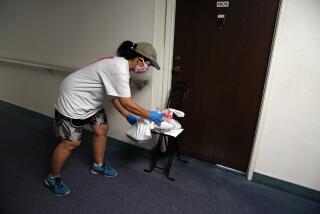Charities canât keep up with spreading poverty
Catholic Charities of Orange County assembled Thanksgiving dinners for 500 families this week, filling plastic bags with frozen turkeys, cranberry sauce and other fixings. But word of the free food attracted 920 families, many of whom left empty-handed when the Santa Ana agency doled out the goods.
âThere were tears in our eyes as we had to turn people away,â said executive director Terrie Montminy, who referred families elsewhere for food or invited them back the next day for smaller packages.
Charities across the country are facing the same stress this year as their busiest season approaches. Aid organizations are hobbled by dwindling resources and soaring demands for food, clothing, money and other necessities.
And itâs not only the desperately poor who are banging on their doors.
The web of poverty is expanding into the white-collar workforce, with the souring economy upending professionals who were once considered reliable contributors. The director of one Phoenix charity, for instance, says that some of his donors have become his clients.
Charity administrators, pastors and rabbis are forecasting a bleak holiday season and an even more troubling year ahead, given government cutbacks and contributors tightening their belts in response to the deteriorating economy.
The crisis occurs at an alarming time: Such philanthropic groups typically collect most of their revenue at the end of the year, when donors open their wallets to qualify for tax write-offs. As resources vanish, however, the threads of the nationâs extensive social safety nets are fraying, leaving single mothers, elderly shut-ins and others ever more vulnerable.
âThe number of people and families who are forced to seek help is going to continue to grow exponentially in the next year,â said Nancy Volpert, director of public policy at Jewish Family Service of Los Angeles. âThe safety net is being stretched very thin.â
Already, increasing numbers of people who were once prosperous are having to ask for help, according to a variety of accounts.
In a new survey of 44 charities that provide food, shelter and financial assistance, Catholic Charities USA found that 52% reported an increase in middle-class clients, up from 43% in June.
âI receive a call or two every week from people who have been contributors for years who find themselves unemployed,â said Paul Martodam, chief executive of Catholic Charities Community Services in Phoenix. âThey feel terrible. They never pictured themselves as being on the receiving side of charity.â
These new recipients have added to the Phoenix agencyâs mounting troubles. In October, its emergency shelter turned away 161 families and its food pantry had to send away 198 families. Meanwhile, 526 families couldnât get help with utility bills, Martodam said.
And the worst may be yet to come. The charity typically receives about half its $2.4 million in annual cash contributions in December.
âWe can only give out what comes in,â Martodam said. âThe whole community is just out of resources.â
Across the country, natural disasters have added to relief groupsâ financial strain, with a drum beat of hurricanes, floods, wildfires, tornadoes and winter storms this year depleting their coffers.
The Salvation Army has seen its disaster donations fall, even as overall contributions have remained roughly steady, one official said.
The charity now faces dual pressures: Trying to keep up with growing demand for its storefront services while replenishing relief funds from donors who are tapped out or impassive in the face of repeated catastrophes.
âThe fact that weâve had so many [disasters] has worked against our ability to fund-raise,â said Melissa Temme, a spokeswoman for the national organization. âYou throw in the economy and millions of dollars raised for the political process and you start to see itâs been a very full two years.â
Philanthropy experts say charities are facing one of the most daunting fiscal environments in recent memory. Charitable giving in the coming year, they say, will depend primarily on stock market performance, corporate profits and personal income.
âWe do think there is going to be some pain associated with the charities,â said Patrick Rooney, interim executive director of the Center on Philanthropy at Indiana University. âThey will have to make choices about programs and staff. Itâs going to be a more challenging year.â
The American Red Cross is one charity that appears, for the time being, to be bucking the trend.
Since September, the organization has raised $65 million toward a goal of $100 million to replenish its disaster relief fund; it hopes to raise $30 million in December.
In a nod to the power of the Internet, the Red Cross has hired some of the fundraisers who helped President-elect Barack Obama raise enormous sums of money online.
âIn this economy, a charity has to find every way possible to raise money, and that includes the old-fashioned way and the new techniques and technology we are seeing,â said Suzy DeFrancis, chief public affairs officer for the American Red Cross at its headquarters in Washington, D.C.
It also means being creative.
Members of New City Parish -- a coalition of nine Lutheran churches in Inglewood, South Los Angeles and Compton -- distribute leftovers from restaurants at their food pantries, along with more traditional groceries. Among items on the menus: Chicken wings from Kentucky Fried Chicken and crab legs from Red Lobster.
The groupâs executive director, the Rev. Scott Fritz, also envisions âurban gardeningâ that would allow communities to grow their own vegetables. Last weekend, members of Fritzâs congregation, Chapel of Peace Lutheran Church in Inglewood, reached out to the communityâs homeless and working poor, inviting 180 people into the church for meals.
âThe poor are coming around to help the poor,â the pastor said. âIt makes us see that weâre all in this together.â
Others also believe the solution lies in faith.
The Rev. Pat OâReilly had worried about making ends meet this fall at the Ecumenical Council Pasadena Area Churches, a coalition of 50 Protestant and Catholic congregations, as cash donations fell and the numbers of needy increased at its food pantry. Then, to OâReillyâs surprise, the council received two foundation grants last month worth $19,500.
âIf you give,â OâReilly said, âGod will take care of you.â
--
More to Read
Sign up for Essential California
The most important California stories and recommendations in your inbox every morning.
You may occasionally receive promotional content from the Los Angeles Times.










